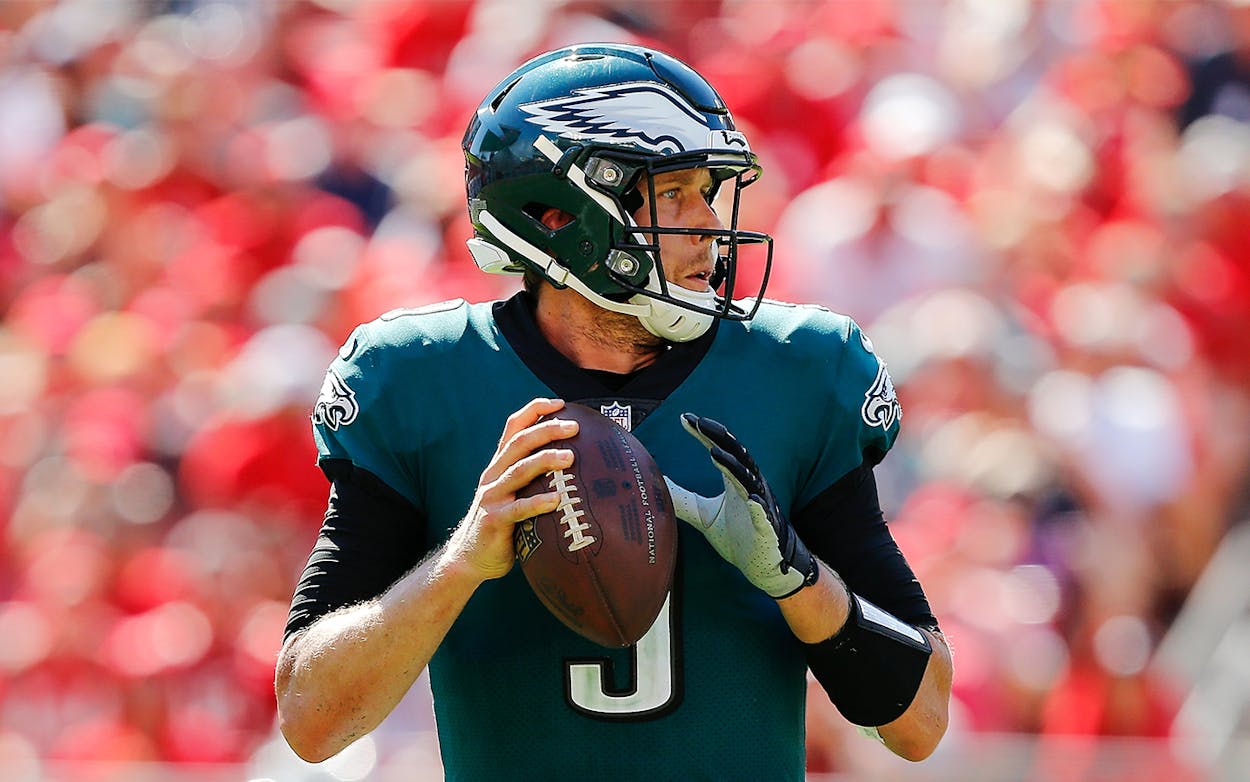It’s still tough to know exactly what to make of Nick Foles.
The Texas native and product of Westlake High School was a third-round draft pick for the Philadelphia Eagles who went from Pro Bowler to journeyman during the first few years of his career. He washed out of Philly, bounced around between St. Louis and Kansas City, and returned to the Eagles before the 2017 season to back up highly-touted draft pick Carson Wentz. The Eagles’ story that season is well-told, and only the team’s truest haters (and, because of the team’s rivalry with the Cowboys, many of them live in Texas) could avoid being taken in: Wentz got hurt late in the year, Foles was tapped to start, and he ascended—leading the team not just through a difficult NFC playoff field but all the way to the Super Bowl, where his gutsy play dethroned the dreaded New England Patriots. He was crowned Super Bowl MVP, and then—when Wentz was ready to return to action in week three this season—he was once more relegated to the bench.
The Eagles floundered, but so did the rest of the NFC. So despite a losing record, when Foles took the field as the team’s starter on Sunday night against the feared Los Angeles Rams, the team’s playoff hopes were still technically alive. The Eagles rallied against the favored team, Foles aptly leading the charge, and won. That brought their record to 7-7, a mere game behind the Cowboys for first place in the NFC East.
Last year, Foles was one of the greatest comeback stories in the NFL—the second-stringer who won it all. And now the 29-year-old Austin native is in a position to do it all over again. To get there, Foles and the Eagles will have to top the Texans on Sunday, and then end the season with a win against a flailing Washington team. Even then, they’ll need help—the Vikings will have to drop a game for Philly to earn a wildcard, or the Cowboys will have to stumble at the end of the season—but it’s entirely possible that Foles finds himself once more in the playoffs. If he does, he’ll be in a position to cement a unique legacy for himself as the greatest backup quarterback of all time.
The competition for that title is stiff. Technically, Steve Young, who served as Joe Montana’s backup in San Francisco in the early years of his career, or Aaron Rodgers, who did the same for Brett Favre in Green Bay, would take that title. But unlike those two giants, Foles was a backup QB in the truest sense. Instead of pushing for a chance to start for some team somewhere in 2018, he happily accepted his role as a backup even with a Super Bowl ring. Young and Rodgers were great quarterbacks who spent their early years in the league on the bench, and then became legends once they finally had the opportunity to start. Foles is a come-off-the-bench backup who spends his time in practice taking “mental reps” as he watches the starter take snaps with the first team, then excels when injuries require him to steward the team to victory.
There are a few players in NFL history who’ve delivered when they’ve been in Foles’s position, but not many. Marc Bulger, in 2003, led the Rams to the NFC Championship after replacing Kurt Warner after week one. Bulger had a stretch of a few good years in St. Louis as the team’s starter, but spent his final seasons in the NFL struggling. In the sixties and seventies, Earl Morrall had a remarkable run as a true backup with a trajectory similar to Foles’s: he played for six teams, who acquired him to back up an entrenched starter, and then succeeded in relief. He did this at the highest levels—in Super Bowl V, as a member of the Baltimore Colts, he stepped in for future Hall of Famer Johnny Unitas in the second quarter, leading the Colts to victory over the 1970 Dallas Cowboys. A little over a year later, after being waived by the Colts, he ended up in Miami, where he backed up Bob Griese—yet another future Hall of Famer. He entered the starting lineup in week five, contributing to the NFL’s only undefeated season, and then ceded his starting job to Griese for the Dolphins’ Super Bowl victory.
Morrall’s successes came during a different NFL era—one in which the role of the quarterback was nowhere near as important as it is now. (In Super Bowl V, the game’s MVP was a linebacker for the losing team!) Bulger couldn’t sustain success; Morrall did, but at a time in which quarterbacks were rarely expected to put up the 41 points required to win the Super Bowl last year, or even the 30 it took to put away the Rams on Sunday. Every success that Foles achieves as a backup quarterback comes with more pressure, because quarterbacks in 2018 are expected to do more than ever before.
There’s still a lot that has to happen before Foles is in a position to earn any title as an all-time great anything. Winning on Sunday won’t be easy. The Texans are one of the NFL’s best teams, and the Eagles are not. And the playoffs are no sure thing—succeeding against the Bears and the Saints, which is the team’s most likely path through the postseason, is a daunting proposition. But circumstances have once more conspired to put Foles in a position where he can prove something impressive about himself, and earn a legacy that proves that the Super Bowl LII was no fluke. This year is another chance to add to that—and at 29, there could be plenty more, too.
- More About:
- Sports








